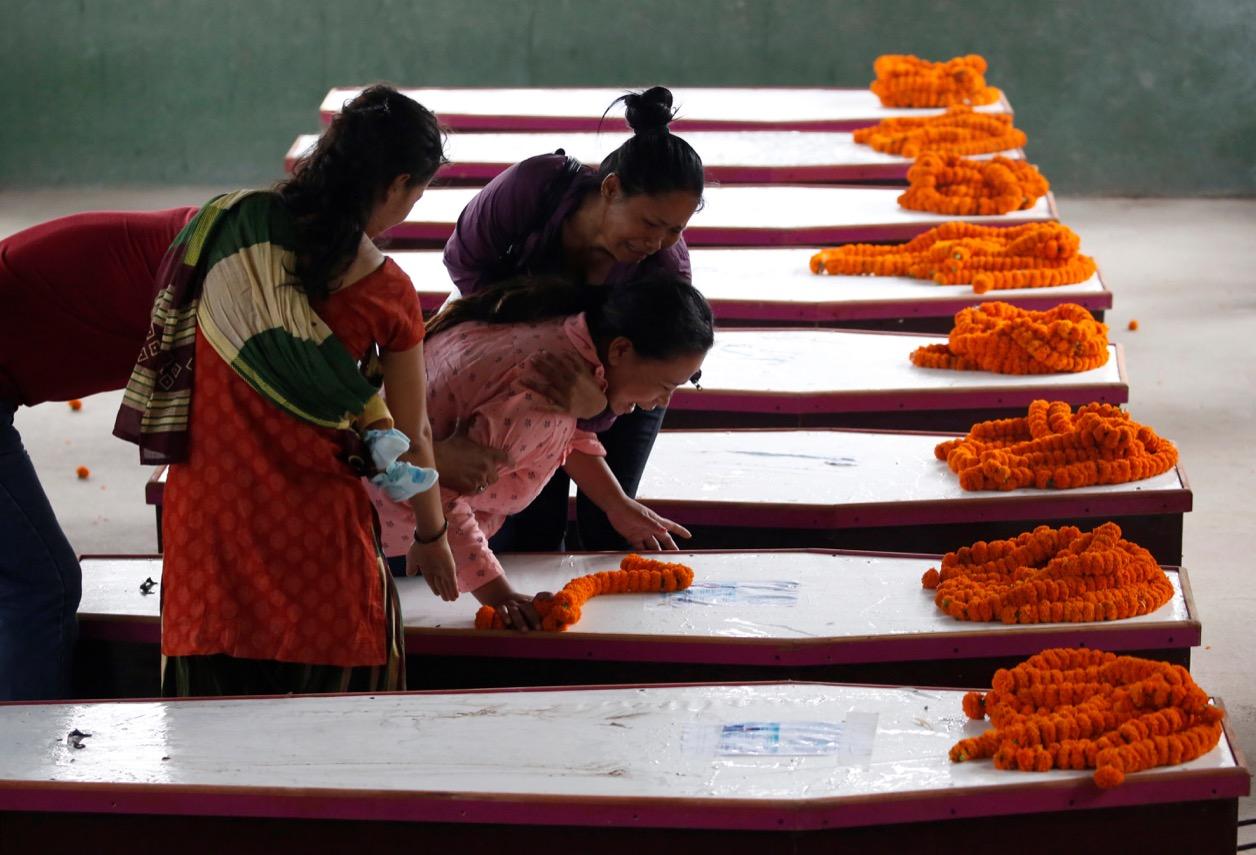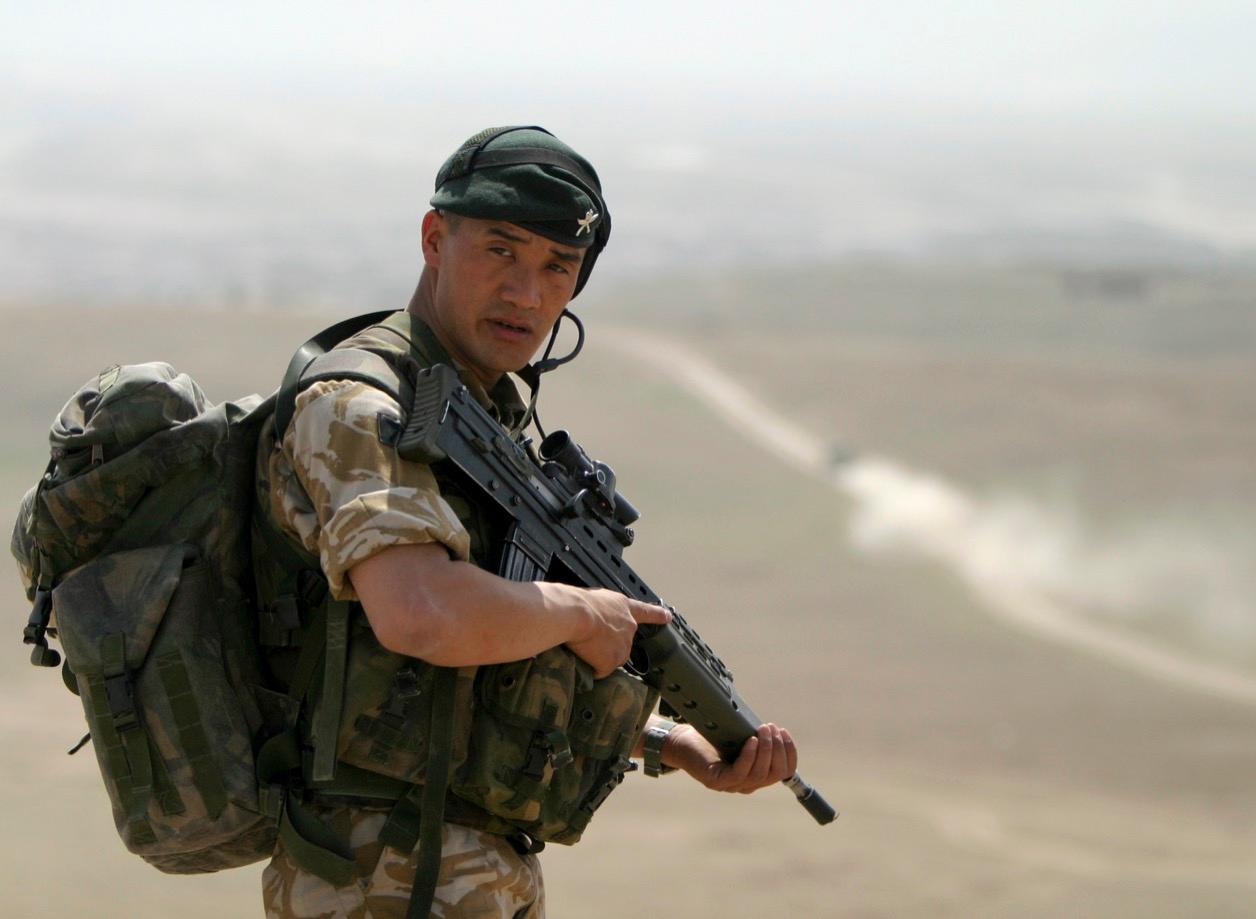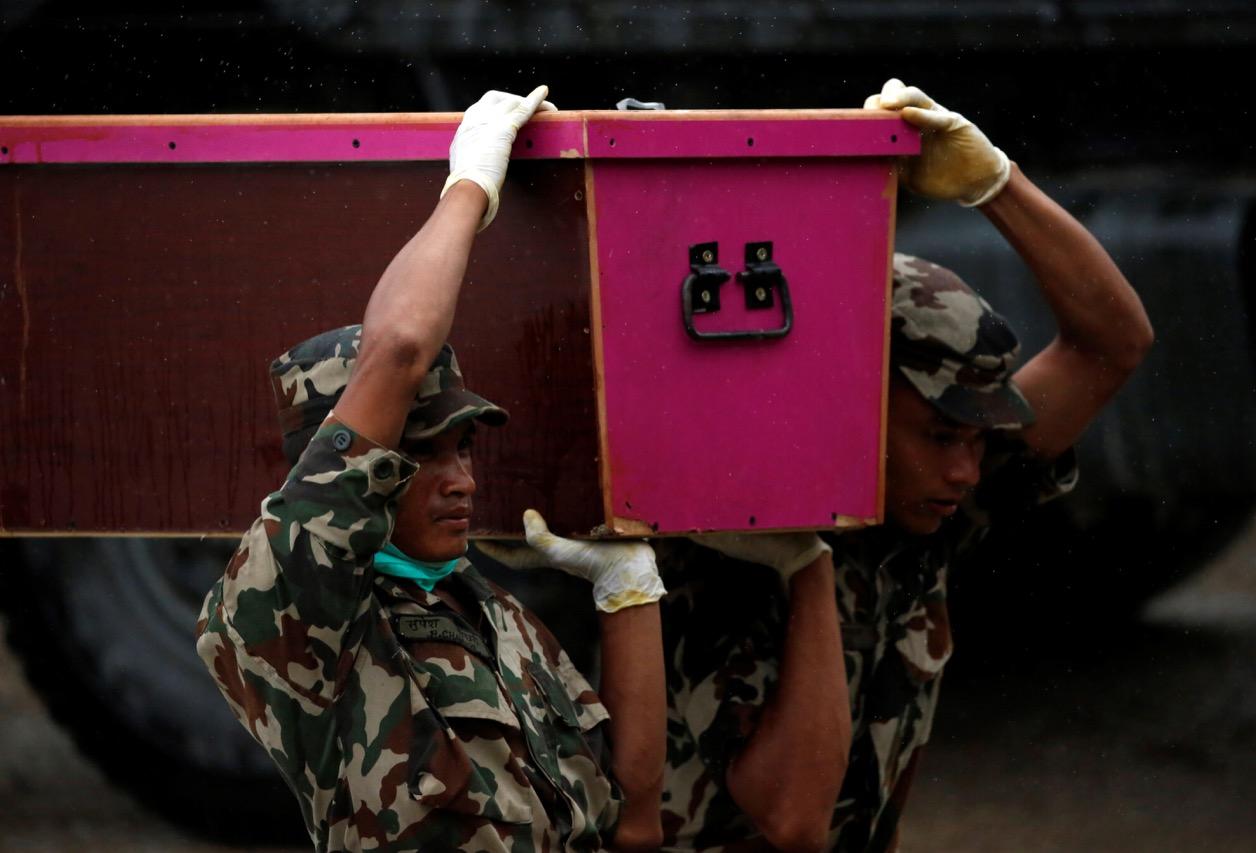Nepali guards risk their lives protecting Western embassies in Kabul. Now they’re targets.
Soldiers at Tribhuvan International Airport in Kathmandu, Nepal on June 22 carry a coffin containing the body of a fellow Nepali man killed when a bomber struck a minibus in Kabul.
Their work placed them in the line of fire, but only paid about $30 a day. Now, hundreds of Nepali men hired to guard Canadian and British embassies in Afghanistan are leaving their jobs.
On June 20, 15 guards were killed when the Taliban attacked the bus taking them from their living compound to the Canadian Embassy in Kabul. The bus didn’t have any security protection and the men on board were unarmed.
“We didn’t think they would attack us, because we are Nepali,” said Shyam Tamang, who worked for the security contractor Sabre International, guarding the Canadian Embassy.
The attack was similar to a January car bomb explosion aimed at a convoy carrying security contractors protecting the US Embassy in Kabul. No victims were killed, but several Nepali and international guards were injured, according to reports.
Despite Nepal staying out of international conflicts since World War II, a complex recruitment network has hired out Nepalis to serve in nearly every war zone — from Kosovo to Sierra Leone to Afghanistan. In recent years, Nepali men have come into high demand as security contractors, including the task of protecting some of the West's key diplomatic facilities. But now, repeated Taliban violence in the Afghan capital is causing an exodus back to Nepal.

Following the June attacks, the Nepali security guards hired to protect the British Embassy asked their employer, G4S, for a $200 raise from their salary of $850 a month and a security escort for the 9-mile trip from their compound to the embassy.
“No protection, no armored vehicles — it’s very dangerous,” said Satya Sapkota, one of the guards who resigned from his British Embassy assignment.
G4S denied the request. Then the guards resigned, refusing to make the dangerous commute to work. At 5:30 Saturday morning, the men woke up to armed guards and were given 30 minutes to pack their bags.
“I don’t understand why the company didn’t accept our demands,” guard Ramesh Gurung said.
When asked, a G4S spokesperson had this to say: “We take the security of all our staff very seriously and take appropriate measures to ensure this. The security situation in Kabul remains complex and operational decisions around the movement of our staff remain under constant review.”
The company, labeled by the Guardian as the world's largest security contractor, has a three-year, $100 million deal to protect the British Embassy, its diplomats and staff.
The guards are making their way back to Nepal this week. Some worked in Afghanistan nearly 10 years and look forward to being reunited with their families.
“I am very, very happy to come back to Nepal,” Gurung says.
Others are putting off the last leg of the trip to their hometowns. First, they need justice. They crowd into tiny hotel rooms in Kathmandu — calling lawyers and journalists, making copies of their labor contracts, written in English they don’t fully understand. They’ve hired a lawyer to present their case to the International Labor Organization, a United Nations agency.
All of the men are looking for work. They mostly hail from the impoverished hill districts and have few job prospects. The brutal landscape here offers little besides subsistence farming. Many here believe the work on the fields and along steep hillsides conditions the men into ideal fighters. But they are often forced to go abroad to make a living.

Among Nepali security contractors, the ex-British Gurkhas command the best pay. But since they can settle in the UK, they don’t often stay in conflict areas.
However, contractors can still find men who carry the reputation of Gurkhas, but at a bargain rate, from the Nepali army and police.
“So far, thousands and thousands of people are working outside [Nepal] in private security as well as armies,” said Mahesh Shrestha, the managing director of G4S Security Services Nepal. “The main reason for this is poverty.”
The G4S subsidiary in Nepal says it does not send workers outside the country itself because of Nepali legal restrictions. But the company maintains a consultant who travels back and forth from the UK, recruiting guards to send around the world.
“They grew up farming the hills. It makes people very hearty. They are adapted to difficult situations,” Shrestha said.
With their reputation of hard work for low pay, the Nepali people are exported by the millions to work in the factories of Malaysia, the construction sites of the Middle East, and the war zones of Iraq and Afghanistan. Remittances sent home by workers abroad prop up the Nepali economy, accounting for 30 percent of GDP, according to the World Bank.
Read more: As number of widows grow, widowhood is changing in Nepal
Nepal's 2004 ban on workers going to war zones has certainly not stopped them. The government estimates 20,000 of its citizens are working in Afghanistan. The authorities reiterated their prohibition in June, although they didn’t offer a plan to repatriate those in Afghanistan now.
In Afghanistan alone, the US has spent $113 billion for relief and reconstruction since 2002 and desperate Nepalis say they are just trying to get their crumb of the pie.
Nepalis have entered the war-torn nation for years through back channels. They travel to New Delhi or Dubai, where they interview with one of the contractors implementing multimillion dollar projects.
The practice raises concerns that the recruitment underworld is exploitative or may even amount to human trafficking. Laborers have to pay the recruiter’s fees, ranging from $1,500 to $3,000 for airfare, visas and arranging the interview. For US government contractors this is illegal. But a November 2014 report by the US Government Accountability Office found thousands of workers paid for their job on a government contract.
Among numerous Nepali laborers interviewed for this article, most said they had to pay a recruiter to get a job. Yet the primary contractors usually keep at least one degree of separation in the hiring process: They hire subcontractors, who hire labor agencies, who work through labor recruiters.
And with billions of dollars being thrown around war-torn countries, a murky environment of violence, corruption and opportunism coalesces.
Into this world enter poor Nepalis — trying to scrape enough cash together to support families and trying not to get killed.
Freelance journalist Stephen Groves reported from Kathmandu.
Every day, reporters and producers at The World are hard at work bringing you human-centered news from across the globe. But we can’t do it without you. We need your support to ensure we can continue this work for another year.
Make a gift today, and you’ll help us unlock a matching gift of $67,000!
